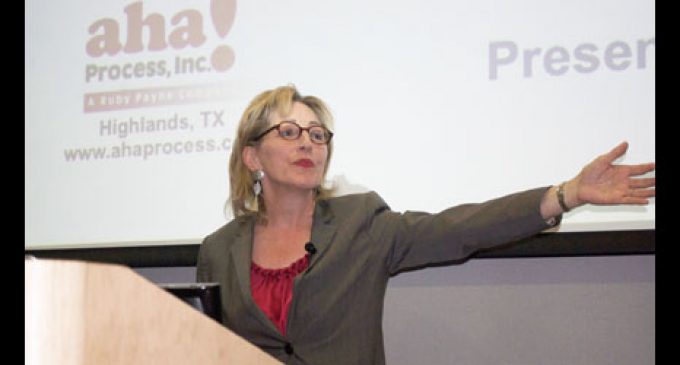Controversial author/researcher gives her take on conquering poverty

Dr. Ruby Payne, author of “Bridges out of Poverty,” led a three-hour workshop last week, schooling a group of more than 150 social service and non-profit officials on ways that they can help their clients thrive.
Payne is the founder of Highlands, Tex.-based aha! Process, Inc., which offers “products and straightforward training to help clients understand the impact of poverty on people’s lives.” The company’s offerings are based on Payne’s research.
The group she addressed Feb. 13 at Goodwill Industries on University Parkway hailed from agencies across the state and included some participants from Maryland, according to Alisa Quick, a spokesperson for the Housing Authority of Winston-Salem, which hosted Payne’s visit.
Payne, whose subject was “Cultural Barriers and Hidden Rules of Poverty, said the American socioeconomic structure can be broken into three groups: the generational poverty group, the middle class and the wealthy. Each group, she said, has its own set of priorities that influence their hidden rules. People of low wealth value relationships most, while the middle class values achievements and the wealthy value connections, she said.
“To move from poverty to middle class, relationships must temporarily be sacrificed for achievement,” she said. “It’s legendary in community colleges that women will get one or two courses from a degree and then they’ll quit, and it has to do with relationships.”
To illustrate the universal nature of the rules, she threw out several open ended sentences based on middle class rules, which the audience answered in unison, without hesitation.
“If you borrow money…” she prompted. “Pay it back,” the group responded.
“And do you tell people your salary?” she asked, to a resounding “No!”
Similarly, each group has its own way of expressing their love for their children. In the middle class, the common practice is to engage the children in activities that promote development, such as sports or artistic programs, whereas the wealthy often enroll their children in boarding schools.
“In generational poverty, if you want to show that you love your children, you buy them designer shoes and clothes because it’s tangible – everybody can see that you love your child and you sacrifice for them,” she explained.
Understanding the rules that govern members of a given class – such as generational poverty – allows service providers to help their clients navigate the obstacles they face in elevating their status and joining the middle class, Payne said.
“Social bridging capital is when you interact with people who are different than yourself. What will derail that fast is when you don’t know the hidden rules,” she remarked. “They’re huge in community interactions.”
Ignorance of hidden rules in a different class can lead to misunderstandings and ineffective programming, because the unseen factors have not been addressed, Payne said. She used the example of a school principal who gave two children at her school $200 to purchase new clothes because their wardrobe was scarce. The children’s mother spent the money on a new television and DVD player. The principal was angry because she didn’t understand one of the chief rules of poverty, Payne said.
“Poverty is painful, and a priority for your money is entertainment,” she explained. “It takes away your pain.”
Payne has been roundly criticized by some academics, who claim her research is based on stereotypes and accuse her of classism, but she said last week that neither is the case. Though certain patterns can be associated with certain groups, Payne said this is a function of the environment they live in, not any contrived perception.
“Patterning is something everybody does as an efficient way of negotiating their environment,” she said.
Sylvia Oberle, executive director of Habitat for Humanity of Forsyth County, said she read “Bridges out of Poverty” and found Payne’s insight helpful.
“It’s absolutely essential,” said Oberle, who brought Habitat’s six senior staffers with her to the seminar. “…I think the point of the book and the point that she’s trying to make today is that institutions like ours, although well meaning, are operating out of that middle class framework, and we are trying to help people transition out of generational poverty. It’s valuable for us to understand this.”
Goodwill CEO Art Gibel said he read Payne’s book last summer and was so blown away by her philosophy that he started distributing it to other nonprofit leaders around town. He is even using it as a model to enhance the way Goodwill delivers services.
Quick said she believes Payne’s seminar could have a positive effect on the broader community.
“As a result of so many people coming together, we hope to get a better understanding of the populations we work with,” Quick stated. “Understanding their point of view regarding life’s challenges will better equip our community partners to help them overcome any hurdles successfully.”













